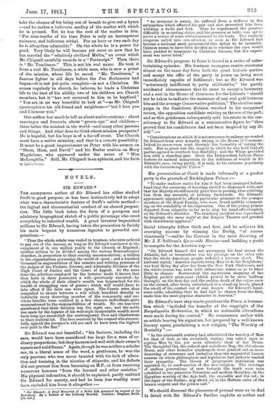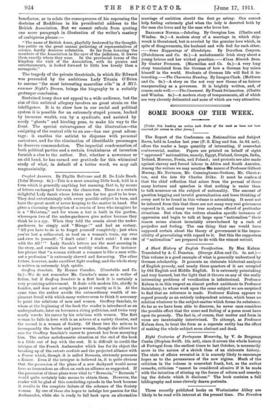NOVELS.
SIR EDWARD.*
TES anonymous author of Sir Edward has either studied Swift to good purpose, or his been instinctively led to adopt what was a characteristic feature of Swift's satiric method— the logical and circumstantial conduct of an absurd proposi- tion. The little book takes the form of a pompous and adulatory biographical sketch of a public personage who owed everything to inherited wealth. A great inventor bequeathed millions to Sir Edward, having taken the precaution to fortify his main bequest by numerous legacies to powerful cor-
porations:—
" Thus the whole estate was vested in trustees, who were ordered to pay out of the income, as long as Sir Edward continued in the enjoyment of it, one million yearly to the Church of England ; another million to be divided among the various Nonconformist churches, in proportion to their seating accommodation; a million to the organizations governing the world of sport ; and a hundred thousand in augmentation of the salaries and retiring pensions of the judges of the Probate, Divorce, and Admiralty Division of the High Court of Justice and the Court of Appeal. At the same time the solicitors employed by the testator made it known that they held in their possession a will—previously executed—by which the whole of their client's wealth was bequeathed for the benefit of struggling men of genius ; which will would have to take effect if the later one were upset. The Courts were thus compelled to choose between a will which benefited directly or indirectly every deserving member of the community and one whose benefits were confined to a few obscure individuals quite unaccustomed to the responsibilities of wealth. No one has ever questioned that their decision was the right one; and the noble use made by the legatee of his well-nigh incalculable wealth must have long ago reconciled the contemporary Poes and Chattertons to their natural lot. The fees received by the counsel who success- fully upheld the inventor's will are said to have been the highest ever paid to the Bar."
Sir Edward was not beautiful ; "his features,'including the ears, would have been considered too large for a man of or- dinary proportions; but they harmonized well with their owner's square and solid frame." Again, though he was neither a scholar nor, in a. literal sense of the word, a gentleman, he was the only parvenu who was never taunted with his lack of educa- tion and training in the niceties of etiquette, and his defects did not prevent him from becoming an 31.P., or from receiving numerous honours "from the learned and other societies." His physical infirmities, it should be explained, partly unfitted Sir Edward for society, and had he been less wealthy must
have excluded him from it altogether :—
Sir Bdward: A Brief Mentorlat of a Noble Life prepared by request of the Eeecutors, By a Fellow of the Literary Society. London: Stephen Swift. 1.1e. net.] " As everyone is aware, he suffered from a stiffness in the extremities which affected his gait and also prevented him from wielding a knife and fork. Thus he experienced the greatest difficulty in mounting stairs, and his presence at table was apt to prove a source of some embarrassment to his hosts. The eminent surgeons called into consultation, as soon as Sir Edward had become a national asset, pronounced this defect to be incurable. Opinion seems to have been divided as to whether the case would have yielded to treatment by Christian Science, but the experi- ment was never tried."
Sir Edward's progress to fame is traced in a series of enter- tertaining episodes. His business managers receive overtures almost on the same day from both the great historic parties and accept the offer of the party in power as being most immediately capable of fulfilment ; but as Sir Edward was
"notoriously indifferent to party shibboleths," the purely accidental circumstance that he came to accept a baronetcy and a seat in the House of Commons for the Liberals " should
not be taken to indicate the existence of any real gulf between him and the average Conservative politician." The election cam- paign in the Caandown division resulted in his unopposed return, the opposition candidate retiring on the eve of the poll ; and as this gentleman subsequently sold his estate in the con- stituency to Sir Edward at a remunerative figure he "thus proved that his candidature had not been inspired by any ill- will " :— " Considerations on which it is not necessary to enlarge prevented Sir Edward from ever actually sitting in the House of Commons. Indeed he never even went through the formality of taking the oath. But so great was the respect in which he was held that all parties agreed to overlook this disability, and the Whips provided him with a standing pair. Even the Independent Labour Party forbore its natural antagonism to the influence of wealth in Sir Edward's case, owing partly, it is said, to his extreme popularity with the Costermongers' Union."
His presentation at Court is made informally at a garden party in the grounds of Buckingham Palace :—
" To make matters easier for him it had been arranged before- hand that the ceremony of kneeling should be dispensed with, and that his Majesty should merely greet him in passing, thus relieving him from any necessity of retiring backwards. Sir Edward's appearance appeared to afford particular pleasure to the younger members of the Royal Family, who were heard audibly comment- ing on the amiability of his expression. One of the young princes departed from etiquette so far as to clap his hand affectionately on Sir Edward's shoulder. The touching incident was reproduced by biograph the same night at the Empire Theatre and greeted with tumultuous applause."
Social triumphs follow thick and fast, and he achieves his crowning success by winning the Derby, " of course vicariously "—unlike the Centaur in the most diverting of Mr. J. F. Sullivan's Queer-side Stories—and building a yacht to compete for the America cup :- "Sir Edward himself did not accompany his boat across the Atlantic, but so tremendous was his prestige on the other aide that the whole American people suffered a nervous shock. The national signal, 'America expects every Man to do his Neighbour,' was kept flying day after day from the New York Clubhouse, and the whole course was sown with submarine mines, so as to leave little to chance. Fortunately the mysterious snapping of the English yacht's main-mast (which proved to be sawn halfway through) ' on the first day and the sudden death of the entire crew on the second, after being entertained at a stand-up lunch, placed the result of the contest out of real danger. Sir Edward's hand- some cable, admitting that he had had no chance from the first, made him the most popular character in America."
Sir Edward's next step was to purchase the Times, a transac- tion which "included the transfer of the copyright of the Encyclopedia Britannica, in which no noticeable alterations were made during his control" He commences author with an article bearing his signature, but prepared by a well-known literary agent, proclaiming a new religion, " The Worship of
Brutality " :—
"As the nineteenth century had substituted the worship of Man for that of God, so the twentieth century was called upon to replace Man by the yet more altruistic ideal of the Brute. The thonghful Cat, the refined and melodious Dog, the chivalrous Horse, and other homelier quadrupeds were pointed out as more deserving of reverence and imitation than the ungrateful human swarms on whom philosophers and legislators had hitherto wasted their sympathy. The theory of progressive (revelation was appealed to, in confirmation of the new religion. The strivings of endless generations of men towards the truth were seen exhibited in the primitive Totemism and modern Heraldry ; in the Egyptian worship of the Apis bull, the crocodile and the cat ; in the signs of the Zodiac ; aril above all in the Hebrew cults of the brazen serpent and the golden calf."
We should discount the pleasures of perusal were we to deal in detail with Sir Edward's further exploits as author and
benefactor, or to relate the consequences of his espousing the doctrine of Buddhism in his presidential address to the British Association. But we cannot refrain from quoting one more paragraph in illustration of the writer's mastery of ambiguous phrase :— " The name of British Asses, playfully bestowed by the thought- less public on the great annual gathering of representatives of science, hardly deserves refutation. So far from lowering the members of the Association in the eyes of the judicious, it leaves them exactly where they were. In the provincial towns of the kingdom the visit of the Association, with its picnics and entertainments, is looked forward to little less keenly than a menagerie."
The tragedy of the private theatricals, in which Sir Edward was persuaded by the ambitious Lady Titania O'Brien to assume "the most interesting masculine role" in A Mi slimmer Night's Dream, brings the biography to a suitably grotesque conclusion.
Sustained irony does not appeal to a wide audience, but the aim of this satirical allegory involves no great strain on the intelligence. It is to show how in our social and political system it is possible for an extremely stupid person, backed by immense wealth, run by a syndicate, and assisted by needy " ghosts " and hireling pens, to make his way to the front. The special extravagance of the illustration—the assigning of the central role to an ass—has one great advan- tage: it enables the satirist to dispense with personal caricature, and for the elimination of identifiable personages he deserves commendation. The impartial condemnation of both political parties and a certain freakishness of invention furnish a clue to the author. But, whether a newcomer or an old hand, he has earned our gratitude for this whimsical study of what, in default of a better word, we may call magnasininity.











































 Previous page
Previous page